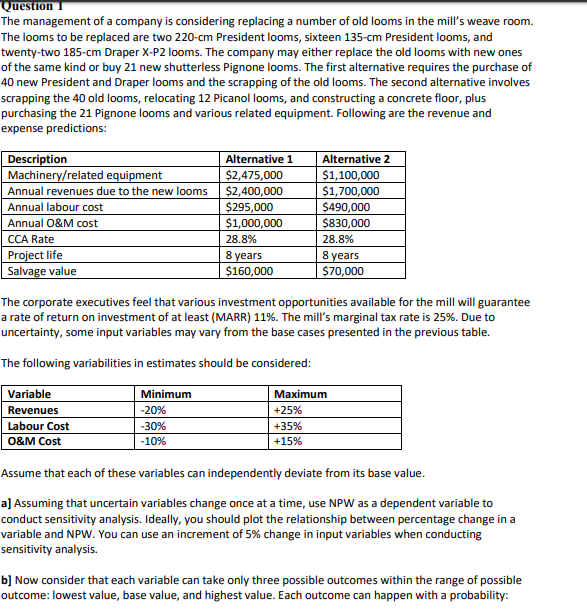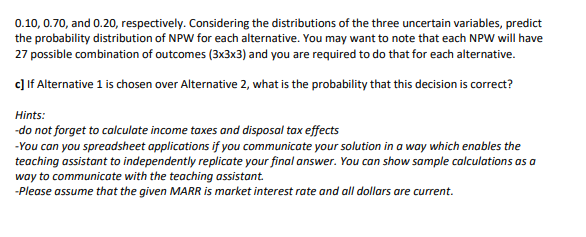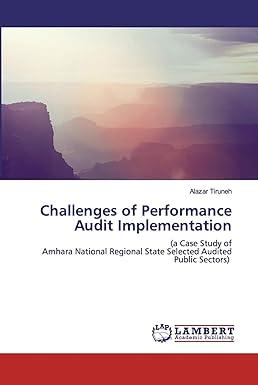

Question The management of a company is considering replacing a number of old looms in the mill's weave room. The looms to be replaced are two 220-cm President looms, sixteen 135-cm President looms, and twenty-two 185-cm Draper X-P2 looms. The company may either replace the old looms with new ones of the same kind or buy 21 new shutterless Pignone looms. The first alternative requires the purchase of 40 new President and Draper looms and the scrapping of the old looms. The second alternative involves scrapping the 40 old looms, relocating 12 Picanol looms, and constructing a concrete floor, plus purchasing the 21 Pignone looms and various related equipment. Following are the revenue and expense predictions: Description Machinery/related equipment Annual revenues due to the new looms Annual labour cost Annual O&M cost CCA Rate Project life Salvage value Alternative 1 $2,475,000 $2,400,000 $295,000 $1,000,000 28.8% 8 years $160,000 Alternative 2 $1,100,000 $1,700,000 $490,000 $830,000 28.8% 8 years $70,000 The corporate executives feel that various investment opportunities available for the mill will guarantee a rate of return on investment of at least (MARR) 11%. The mill's marginal tax rate is 25%. Due to uncertainty, some input variables may vary from the base cases presented in the previous table. The following variabilities in estimates should be considered: Variable Revenues Labour Cost O&M Cost Minimum -20% -30% -10% Maximum +25% +35% +15% Assume that each of these variables can independently deviate from its base value. a] Assuming that uncertain variables change once at a time, use NPW as a dependent variable to conduct sensitivity analysis. Ideally, you should plot the relationship between percentage change in a variable and NPW. You can use an increment of 5% change in input variables when conducting sensitivity analysis. b] Now consider that each variable can take only three possible outcomes within the range of possible outcome: lowest value, base value, and highest value. Each outcome can happen with a probability: Question The management of a company is considering replacing a number of old looms in the mill's weave room. The looms to be replaced are two 220-cm President looms, sixteen 135-cm President looms, and twenty-two 185-cm Draper X-P2 looms. The company may either replace the old looms with new ones of the same kind or buy 21 new shutterless Pignone looms. The first alternative requires the purchase of 40 new President and Draper looms and the scrapping of the old looms. The second alternative involves scrapping the 40 old looms, relocating 12 Picanol looms, and constructing a concrete floor, plus purchasing the 21 Pignone looms and various related equipment. Following are the revenue and expense predictions: Description Machinery/related equipment Annual revenues due to the new looms Annual labour cost Annual O&M cost CCA Rate Project life Salvage value Alternative 1 $2,475,000 $2,400,000 $295,000 $1,000,000 28.8% 8 years $160,000 Alternative 2 $1,100,000 $1,700,000 $490,000 $830,000 28.8% 8 years $70,000 The corporate executives feel that various investment opportunities available for the mill will guarantee a rate of return on investment of at least (MARR) 11%. The mill's marginal tax rate is 25%. Due to uncertainty, some input variables may vary from the base cases presented in the previous table. The following variabilities in estimates should be considered: Variable Revenues Labour Cost O&M Cost Minimum -20% -30% -10% Maximum +25% +35% +15% Assume that each of these variables can independently deviate from its base value. a] Assuming that uncertain variables change once at a time, use NPW as a dependent variable to conduct sensitivity analysis. Ideally, you should plot the relationship between percentage change in a variable and NPW. You can use an increment of 5% change in input variables when conducting sensitivity analysis. b] Now consider that each variable can take only three possible outcomes within the range of possible outcome: lowest value, base value, and highest value. Each outcome can happen with a probability








